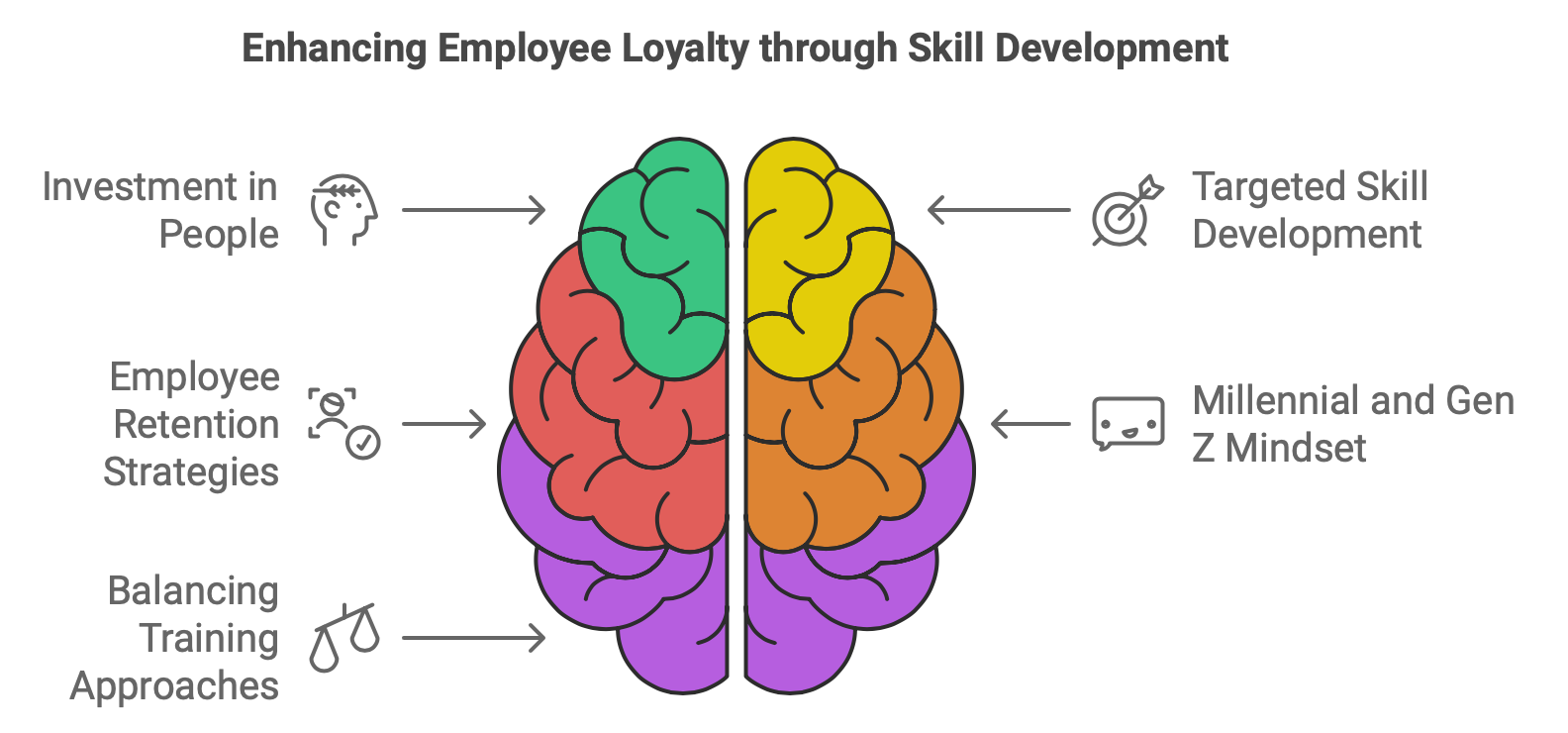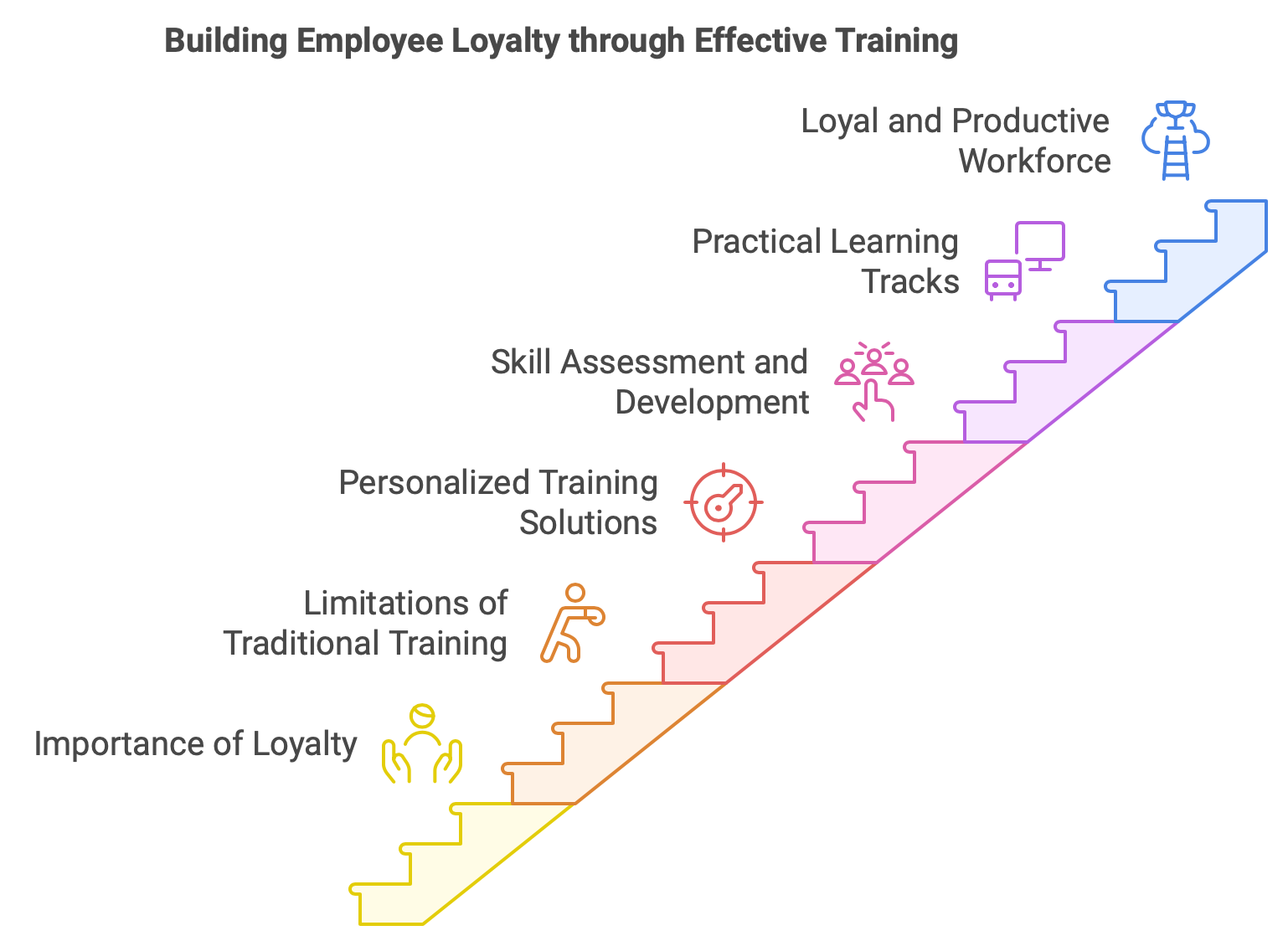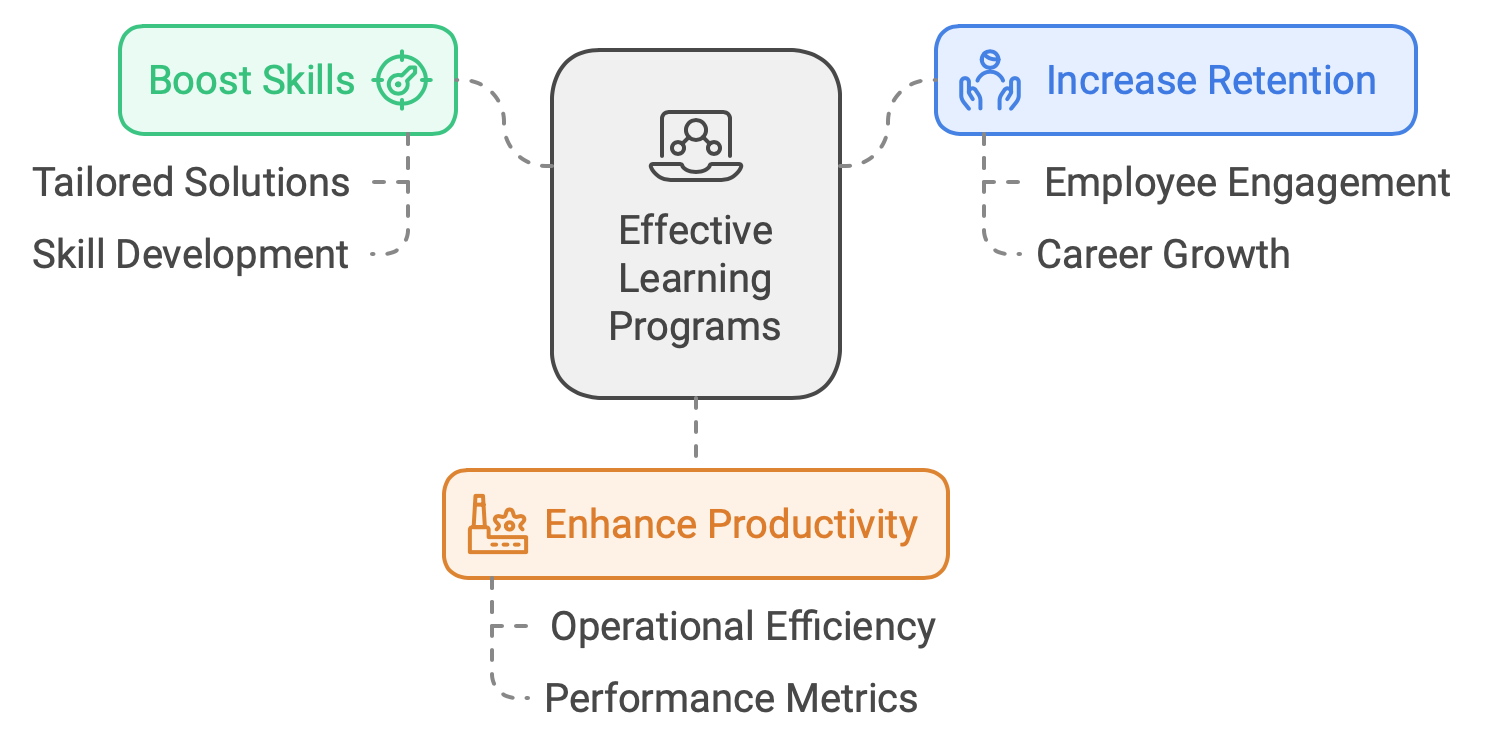Loyalty through Learning: How Skill Development Empowers and Retains Employees
Over the years, I've seen firsthand how crucial it is for companies to invest in their people. Yet, I've also watched many organizations pour resources into employee training only to see little return on investment. Generic training programs are often the culprits—they may sound good on paper but fall short in practice, failing to equip employees with the specific skills the business really needs. Meanwhile, relying on internal mentoring can unintentionally burden experienced staff, pulling them away from their primary roles and slowing down productivity. It’s a delicate balance that requires careful management.
But then there are platforms which offer a fresh approach. They help companies develop targeted skills, aligning training with real business needs rather than taking a one-size-fits-all approach. This makes a tangible difference in both employee performance and overall company success.
But then there are platforms which offer a fresh approach. They help companies develop targeted skills, aligning training with real business needs rather than taking a one-size-fits-all approach. This makes a tangible difference in both employee performance and overall company success.

The Struggle to Retain Talent is Real
I’ve been around long enough to see that finding great talent is getting harder and harder. Talent shortages are hitting every industry, especially in tech. Even with tech salaries rising by 25% over the past year, the industry is still grappling with a shortage of up to a million skilled workers. The situation isn’t helped by the fact that Millennials and Gen Z - my own kids included - just don’t view long-term job loyalty the way previous generations did. They’re quick to change jobs in pursuit of better work-life balance, and they’re not afraid to walk away from companies that enforce rigid rules.
This shifting mindset has forced companies to rethink their retention strategies, making employee loyalty just as critical as recruitment. I remember a time when hiring was the main focus of HR departments. Now, keeping employees engaged and happy has become equally—if not more—important.
This shifting mindset has forced companies to rethink their retention strategies, making employee loyalty just as critical as recruitment. I remember a time when hiring was the main focus of HR departments. Now, keeping employees engaged and happy has become equally—if not more—important.
Why Loyalty Matters More than Ever
Every HR leader I know agrees on one thing: a loyal workforce is a company’s best defense against high turnover. The specifics of managing people—whether you’re running a startup or a global corporation—might differ, but at the end of the day, it comes down to building loyalty. It’s this loyalty that keeps people around when the going gets tough and drives them to put in their best effort every day.
From my experience, satisfied employees aren’t just more productive—they also create a positive work environment that’s contagious. They become brand ambassadors, spreading the word about what a great place your company is to work. And let’s be honest: in a world where bad reviews travel faster than good ones, that kind of positive buzz is priceless.
From my experience, satisfied employees aren’t just more productive—they also create a positive work environment that’s contagious. They become brand ambassadors, spreading the word about what a great place your company is to work. And let’s be honest: in a world where bad reviews travel faster than good ones, that kind of positive buzz is priceless.

Unlocking Loyalty through Growth and Learning
Over the years, I’ve noticed that competitive salaries, flexible work schedules, and comprehensive benefits packages are all great, but they’re not enough on their own to build true loyalty. Employees today are looking for something deeper—they want to know that their company is invested in their growth. Training and career development opportunities are no longer just perks; they’re essential.
Back in 2020, a survey revealed that 73% of job seekers expected companies to have a solid training system in place, viewing it as a critical factor in their job search. I’ve seen this trend grow, with employees increasingly demanding opportunities to upskill and reskill. They’re not content to stagnate; they want to keep learning and evolving, which is why companies are now filling vacant roles by upskilling existing employees rather than hiring externally. It’s a smart move that not only fills skill gaps but also strengthens loyalty.
Back in 2020, a survey revealed that 73% of job seekers expected companies to have a solid training system in place, viewing it as a critical factor in their job search. I’ve seen this trend grow, with employees increasingly demanding opportunities to upskill and reskill. They’re not content to stagnate; they want to keep learning and evolving, which is why companies are now filling vacant roles by upskilling existing employees rather than hiring externally. It’s a smart move that not only fills skill gaps but also strengthens loyalty.
The Pros and Cons of In-House Training
I’ve been involved in setting up in-house training programs before, and let me tell you—it’s no small feat. Building an effective training system requires significant time, money, and expertise. Especially in tech, where the rapid pace of change means that yesterday’s skills can quickly become outdated. I’ve seen companies try to rely on internal experts to train others, but this approach can backfire. Mentorship programs often pull experienced employees away from their own projects, stalling their growth and, sometimes, frustrating both mentor and mentee.
There’s also a psychological dynamic at play—sometimes employees can get stuck in a “student” mindset, which can affect their confidence and team integration once the training is over. I've witnessed poorly managed training that left employees feeling undervalued, and ultimately, they became less loyal. It’s a delicate balance, and getting it wrong can be costly.
There’s also a psychological dynamic at play—sometimes employees can get stuck in a “student” mindset, which can affect their confidence and team integration once the training is over. I've witnessed poorly managed training that left employees feeling undervalued, and ultimately, they became less loyal. It’s a delicate balance, and getting it wrong can be costly.
Personalized Training: A Game Changer
From my perspective, investing in tailored, personalized training solutions is the way forward. Unlike generic programs, these are designed with specific business needs in mind, with clear, measurable outcomes. There is a great example of how this can work in practice. It’s a comprehensive learning platform that doesn’t just offer courses—it aligns training directly with company goals and individual employee needs. It’s about creating a custom learning experience that actually moves the needle.
How Some Platforms Make It Work
What I like about some platforms is that it’s a one-stop shop for skill assessment and development. Everything is centralized, making the whole process smoother and less time-consuming. When I’ve worked with platforms like this, it’s been a breath of fresh air compared to cobbling together different training providers. The process begins with a thorough assessment of an employee’s current skills, matched against the needs of the business or a specific project. This external evaluation removes the guesswork and ensures that everyone gets the right training for their role.
Based on this assessment, the platform instructional designers create personalized learning tracks that cut out the fluff. Employees don’t waste time on topics they already know—they dive straight into the areas that need improvement. This approach is highly practical, ensuring a solid return on investment. The learning tracks consist of mandatory courses, hands-on exercises, and webinars, all delivered by industry experts vetted for their skills and experience.
Based on this assessment, the platform instructional designers create personalized learning tracks that cut out the fluff. Employees don’t waste time on topics they already know—they dive straight into the areas that need improvement. This approach is highly practical, ensuring a solid return on investment. The learning tracks consist of mandatory courses, hands-on exercises, and webinars, all delivered by industry experts vetted for their skills and experience.
Tracking Progress and Measuring Success
One of the things I appreciate most about platforms is the transparency they offer. HR teams can track an employee’s progress in real time, generating reports that clearly show the impact of training on performance. It’s not just about checking a box—it’s about understanding how these new skills translate into better business outcomes. I’ve found that this kind of data-driven approach is incredibly valuable when it comes to justifying training investments to senior leadership.
At the end of the learning journey, employees take a final assessment to gauge their improvement. This structured, outcome-focused model not only accelerates the training process but also keeps it relevant to the business’s needs. Instead of wading through outdated course materials, employees are upskilling in real time, applying what they’ve learned directly to their work.
At the end of the learning journey, employees take a final assessment to gauge their improvement. This structured, outcome-focused model not only accelerates the training process but also keeps it relevant to the business’s needs. Instead of wading through outdated course materials, employees are upskilling in real time, applying what they’ve learned directly to their work.
More Than Just a Platform: A Learning Ecosystem
Some learning platforms aren’t just about formal training—it’s a complete learning ecosystem. It offers a self-paced library with over 350 courses covering more than 1,000 skills, along with flexible coaching options tailored to the specific needs of each company. Whether it’s group sessions, one-on-one coaching, or a custom support plan, there’s a solution to fit every learning style and objective.
From what I’ve seen, this holistic approach does wonders for motivation and loyalty. Employees feel valued and respected when their learning journey is personalized and focused on practical skills they can immediately apply. It’s a far cry from the old-school mandatory training sessions that often felt like a box-ticking exercise.
From what I’ve seen, this holistic approach does wonders for motivation and loyalty. Employees feel valued and respected when their learning journey is personalized and focused on practical skills they can immediately apply. It’s a far cry from the old-school mandatory training sessions that often felt like a box-ticking exercise.
Final Thoughts
Reflecting on my experiences, I can confidently say that investing in employee training is one of the best ways to boost loyalty and long-term retention. It’s not just about teaching new skills—it’s about demonstrating to your employees that you value their growth and respect their time. Companies that prioritize meaningful, practical learning opportunities are rewarded with a more engaged, motivated workforce. And when employees feel supported in their professional journey, they’re far more likely to stick around, driving down turnover and lifting productivity across the board.
In the end, the skills they acquire benefit not just the individual but the entire organization, creating a culture of continuous improvement that fuels ongoing success.
In the end, the skills they acquire benefit not just the individual but the entire organization, creating a culture of continuous improvement that fuels ongoing success.
Need help designing effective learning programs and long-term development plans for your employees?
Whether you're aiming to boost skills, increase retention, or enhance overall productivity, we can help you create tailored solutions that align with your business goals. Get in touch today to start building a more engaged and future-ready teams and workforce.
My Telegram and LinkedIn Profiles.
My Telegram and LinkedIn Profiles.
What is included when UnitiQ helps to create Learning and Development Programs









